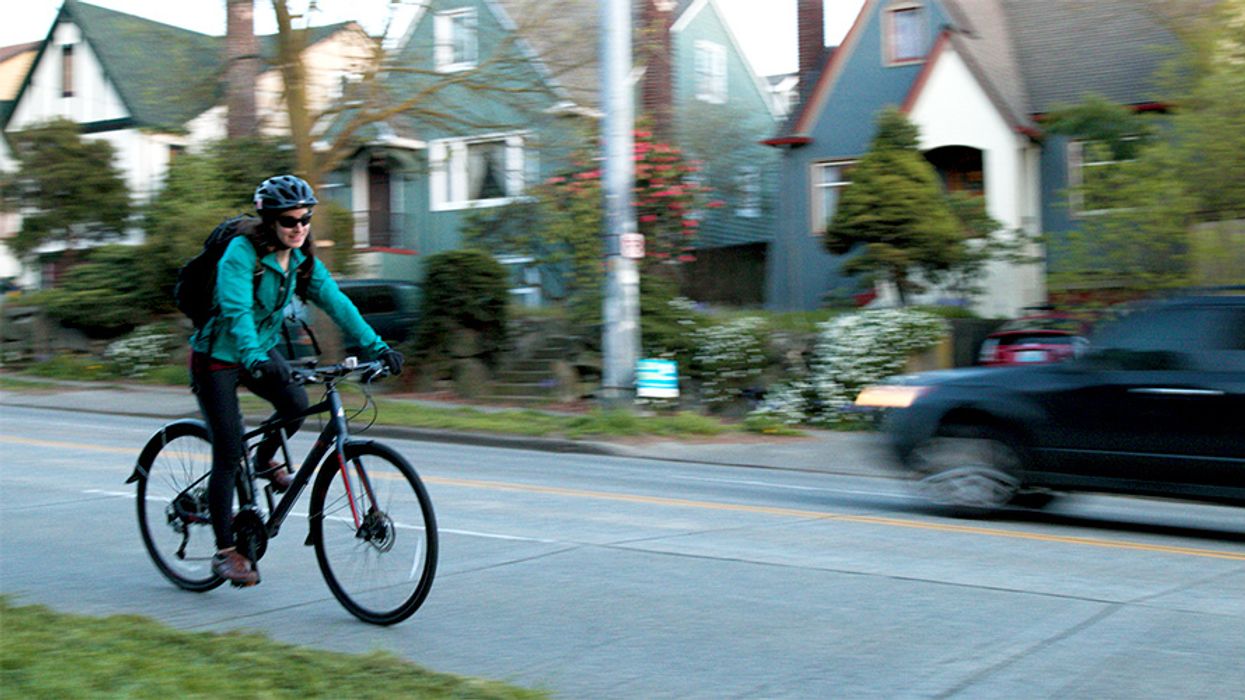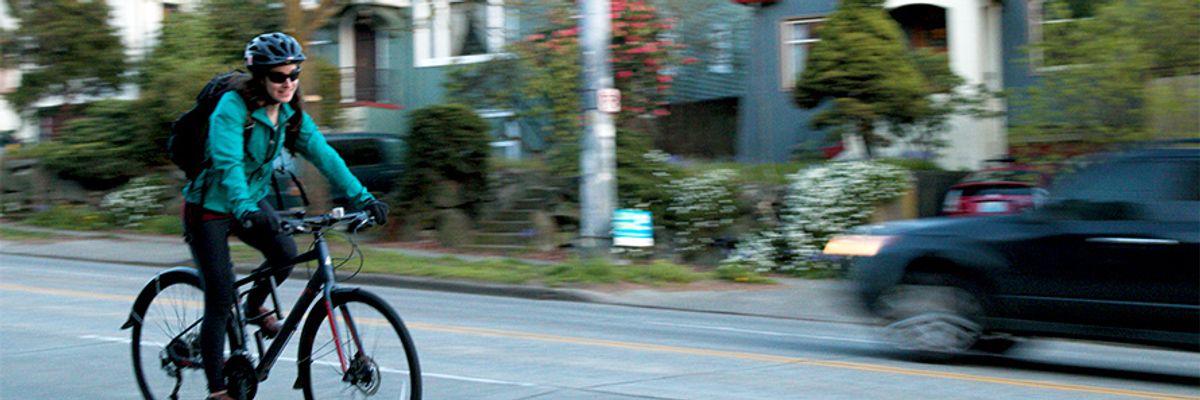I see toxic chemicals everywhere.
It's an occupational hazard for me as a toxicology PhD student in the UW Department of Environmental & Occupational Health Sciences. I spend my days learning and writing about all things environmental health, so naturally, I'm worried about my own exposures to the pollutants around us.
I do what I can to minimize my exposures by buying organic, avoiding processed and packaged foods, minimizing my use of plastics, choosing fragrance-free products and searching for flame retardant-free furniture.
Yet there's one lifestyle choice that I'm not willing to give up: city biking.
Sharing the road
I bike to the UW every day. I love riding to campus; it's my morning and evening meditation time and exercise.
While I ride on the Burke-Gilman trail most of the way, there are several segments on roads. Obviously, biking on busy, car-filled streets presents immediate physical dangers.
Just as worrisome to me is the air pollution I inhale as I take deep breaths alongside cars and buses. Luckily, I'm not affected by asthma or other respiratory problems. Yet I can't help but think about the link between air pollution and other health issues, including cardiovascular disease and dementia (the subject of my PhD dissertation).
Am I causing myself more harm than good on my bike commute? Why am I willing to impose strict controls on what I eat and buy, yet allow myself to breathe noxious miasma every single day?
A toxic brew
What am I breathing on my daily commute?
It includes:
- Particulate matter, a mix of dust, dirt and soot particles from wood stoves, fires, power plants and vehicles, associated with harmful effects on the cardiovascular, respiratory and cognitive systems.
- Nitrogen oxides, reactive gases emitted from vehicles and power plants that are highly irritating to the respiratory system.
- Volatile organic compounds released from fuels and vehicle exhaust, many of which are classified as "hazardous air pollutants" by the US EPA.
- Ozone, formed through chemical reactions, that triggers respiratory health effects.
- Carbon monoxide from incomplete combustion from cars, trucks and machinery associated with effects on the heart and brain.
- Sulfur dioxide released from industrial facilities and vehicles burning fuel with high sulfur content, linked to respiratory problems.
Yuck.
How does dirty air affects bikers’ health?

Credit: Flo Karr/Upsplash
During vigorous exercise, we breathe in these pollutants at two to five times higher rates and more deeply than we do at rest.
In studies of cyclists, researchers have found that biking in traffic is associated with short-term increases in inflammatory blood cells, decreased lung function and alterations in heart rate variability.
We don't yet fully understand the long-term consequences of these changes. While research to date suggests that the long-term benefits of biking outweigh the potential risks, current reviews may underestimate the long-term costs to my health because:
- Most focus on the impact on mortality, rather than on other health effects from air pollution that could lead to decreased quality of life.
- Most only consider the effects of a single pollutant rather than the effects of combined exposures to multiple traffic-related air pollutants.
- The alternative scenario in these assessments is decreased physical exercise. In other words, they are roughly comparing: [exercise + pollution] vs. [no exercise + pollution]. The benefits of physical activity are enormous, so this equation naturally tips toward the [exercise + pollution] side. But if I didn't commute by bike, I would replace it with alternative activities (with less air pollution). If my own equation is instead [exercise + pollution] vs. [exercise + less pollution], maybe the analysis would be different.
At least we’re not in Bangkok
I'm still trying to understand the calculations that led me to decide to expose myself to substantial pollution every day. Maybe it is because I have control in this situation? It is, after all, my choice to bike.
Maybe it's because Seattle appears to have relatively clean air compared to other places I've lived (Atlanta and Bangkok)?
Or maybe I just love biking too much, and this is where I draw my personal line. While it is important to me to minimize harmful exposures, I can't live in a bubble. Life involves risk, and I've somehow decided that this is one I'm willing to take. Biking every day brings me too much happiness to give up, at least for now.
The case for improving air quality
While I continue to bike, there are things I can do to reduce my exposures.
In addition to consistently wearing the air pollution mask I bought last summer, I can check local air quality (like through this pollution app) and avoid riding on particularly bad days. When bike paths are not available, I can find alternate routes on low-traffic roads where I will be less exposed to dirty air.
As individuals, we have limited control over our own exposures. In the end, we need systemic, societal changes to make cities safer and healthier, including stricter controls of vehicle emissions, increased use of electric vehicles, improved public transportation, better bicycling infrastructure and more green space.
Ultimately, I hope that my own research can demonstrate the importance of strengthening air quality regulations and inform policies to reduce exposures.
It's personal now.
Editor's note: This article was originally published on the Health & Safety Matters blog of the UW Department of Environmental & Occupational Health Sciences.
Rachel Shaffer is a Toxicology PhD student in the Department of Environmental and Occupational Health Sciences at the UW Seattle School of Public Health. You can read an extended version of this post on her blog, Rachel Talks Tox.















